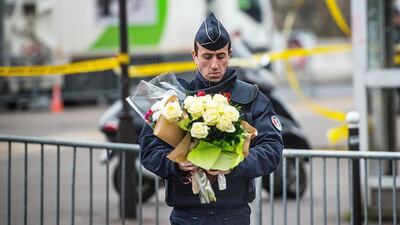LONDON // During recent days of high drama and dispiriting tragedy, the temptation to present France as a country at war has been strong.
It is a notion that appeals more to headline writers and politicians than to common-sense analysis. But the events of Paris and its surrounding area have encouraged even cooler heads to identify lessons for the future of terrorism on western soil.
Andrew Parker, head of the British intelligence service MI5, said the murderous attack on the offices of Charlie Hebdo magazine was a “terrible reminder of the intentions of those who wish us harm”.
Security agencies did their utmost to foil attacks, he said in a speech to the British defence think tank, the Royal United Services Institute, but “we know that we cannot hope to stop everything”.
Mr Parker was speaking a day after the Charlie Hebdon attackers struck, and as the Paris operation widened following the killing, by an apparent accomplice, of a policewoman in southern Paris.
He warned that while recent attention had focused on ISIL, Al Qaeda still posed a major threat with a group of its militants based in Syria planning a series of “mass casualty” attacks against the West.
Serious concern has been aroused, once again, by revelations — coming only after the first of this week’s deadly attacks — that Cherif and Saiud Kouachi were known to the authorities.
The French-Algerian brothers behind the Charlie Hebdo attack, had track records of overseas and domestic extremist activity. Both men, killed in the climax of the police siege at a printing works near Paris on Friday, were on British and United States “no-fly” lists.
Their apparent accomplice, Amedy Coulibaly — killed minutes later as police stormed the kosher supermarket where he had taken hostages — had previously been jailed for his part in a plot to free Smain Ait Ali Belkacem, serving life imprisonment for a 1995 attack on the Parisian Metro.
But French security specialists caution against the idea that the movements of known militants can be continuously monitored.
Up to 1,200 French nationals are believed by officials to have taken part in combat with ISIL and other extremists in Syria and Iraq. Others have joined groups in Somalia, Mali, Yemen and elsewhere. Some 5,000 individuals on French territory alone are considered “of interest” to the security services.
Two former security chiefs, Amaury de Hauteclocque, who headed RAID, a French anti-terrorist police unit, and Louis Caprioli, who was deputy director for counter-terrorism in domestic intelligence services, told France 2 television it would take at least 20 agents to maintain round-the-clock surveillance of a single suspect. Other experts put the ratio even higher.
Antiterrorism forces are also facing a range of related threats that differ enormously in their manner, organisation and scale.
Since the September 11 attacks in the United States, these have ranged from the Madrid and London bombings, killing 192 and 52 respectively in 2004 and 2005, to the murders of seven people in southern France by one French-Algerian gunman, Mohamed Merah, and the slaying by Michael Adebolajo and Michael Adebowale of a British soldier, Lee Rigby, in a London street in 2013.
More recently, Australia was targeted by a single, fanatical gunman, Man Haron Monis, who took hostages and killed two of them before being shot dead in a Sydney cafe. And in separate incidents in France, cars were driven into Christmas markets with the apparent aim of killing and injuring shoppers.
Paul Rogers, professor in peace studies at Bradford university in northern England, says the Kouachi brothers’ action in Paris could not be attributed to “lone wolf” opportunism, given their obvious attention to planning and detail.
He told the BBC this was in clear contrast to incidents such as the Australian siege.
Prof Rogers also pointed out that France was a target for terrorist attack because of its roles in the coalition effort to halt ISIL’s advances in Syria and Iraq and in crushing the militants’ revolt in northern Mali.
But similar considerations apply to Britain and other western countries.
Governments and security chiefs are resigned to the likelihood of sporadic attempts to mount attacks, most of which will fail while a few succeed.
France inevitably remains edgy after a week of violence that left 20 dead, 17 of them innocent victims of cold-blooded, heavily armed men who were also killed.
Further attacks, with or without the quasi-military precision shown by the Kouachis, seem probable in the months and years to come.
Even today’s “unity” rally in Paris amounts to another security headache, with a massive public presence assured and many countries determined to be represented at high level to show solidarity with the French.
One mass murder, two sieges and the killing of a young policewoman led to massive disruption, evacuation of schools, shops, offices and homes and an inevitable escalation of France’s state of security readiness.
But as western security services fight to withstand the multiple threats their countries now face, leaders may increasingly resort to words of the kind uttered on Friday by the French president, Francois Hollande: “Unity is our best weapon … a free people is not afraid.”
foreign.desk@thenational.ae


